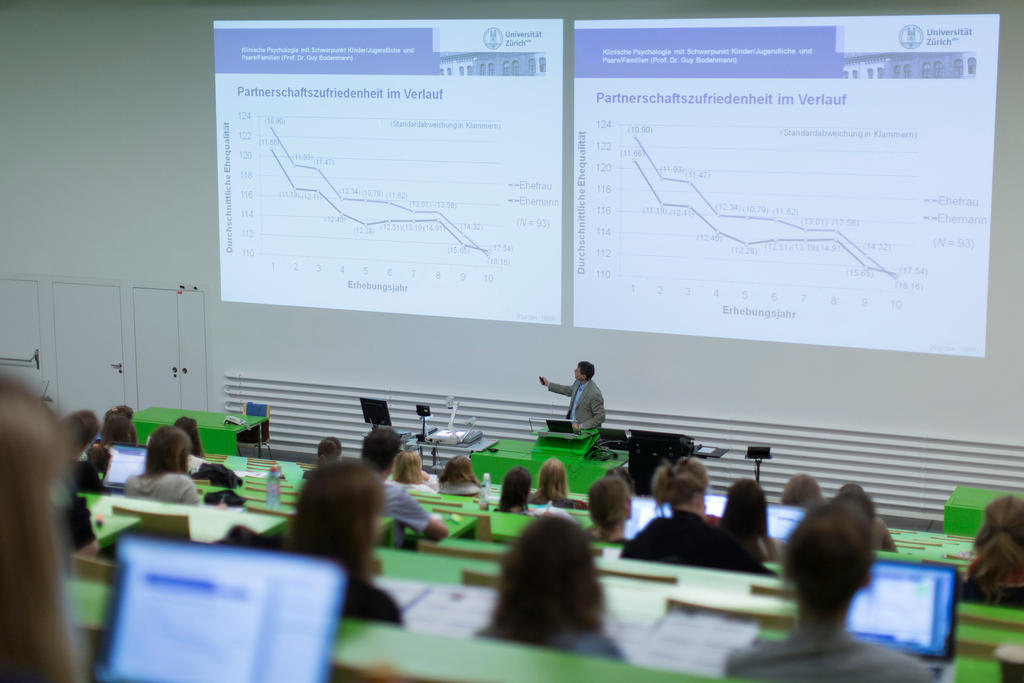Why talented women are disappearing from Swiss universities

Equal numbers of men and women do PhDs in Switzerland, but by post-doc level the number of women dwindles. One university is bringing women back to academia thanks to an innovative programme.
“We have many talented women who disappear from university at post-doc level,” explained Beate Böckem from the university’s Equal Opportunities office.
The University of Basel provides a clear example of the “leaky pipeline” in these statistics for 2016.
The post-doc phase – usually from the late 20s to mid 30s – is key for establishing yourself as a researcher in the academic community, she said. But it’s also time in which many start a family. So faced with a work-life juggle, some women may be dropping out or finding more flexible employment.
Keen not to lose this valuable pool of talent, the university launched Stay on TrackExternal link, a project that targets female post-doctoral students coming back to work after maternity leave. Its goal: providing relief from a key duty during one semester to allow the returner to concentrate on her research.
What is a post-doc?
Becoming a professor is still the most important career goal in an academic career. A doctorate is an essential step towards this goal, but even more key is what comes after: the post-doc phase, says Beate Böckem. This is where establish yourself as a researcher. Areas in which you must prove yourself are: outstanding research, securing your own research funding, mobility to other universities, gaining a Habilitation (academic qualification common in German-speaking world which enables experienced academics to take the Privatdozent teaching role at the faculty) and publishing articles in good journals.
Stay on Track has helped over 40 female researchers since it started in 2014, said Böckem, who coordinates the scheme.
Targeted support
One of them is art and film historian Eva KuhnExternal link, the mother of a 15-month-old boy. Stay on Track provided a temporary teacher to take over one of her weekly seminars after she returned from maternity leave. This allowed her to concentrate on organising a three-day international symposium on the work of the late Belgian filmmaker and artist Chantal AkermanExternal link – a project “dear to my heart”, as she told swissinfo.ch.
Kuhn describes the symposium as a great success, for which a publication is in sight. “In retrospect, this was a key career step. And without the support, I would not have had the courage and energy to put the project into effect,” she explained.
Plant scientist Cristina MorenoExternal link, is a mother of two children under the age of three. She is working on plant responses to climate change, using herbarium collections. Thanks to Stay on Track, she was able to hire some students to prepare the 3,000 samples she had taken for isotope analysis. It’s routine, but time-consuming work.
“It was very important because otherwise I would have needed to take much more time away from my family,” she says. “When I was not in the lab, I could then focus on other things, like analysing my preliminary results and going to conferences.”
The advantage of Stay on Track is that the application form is simple to fill in. From the university side, it is relatively easy to organise and doesn’t cost too much, Böckem said. Plus it has high-level support.
“The University of Basel is acutely aware of the glass ceiling for female researchers,” explains university Vice President Edwin Constable, who has given his personal backing to the project.
“We believe that with the programme Stay on Track, the University of has developed a best practice model for supporting excellent female researchers in their academic careers that could be adopted nationally.”
Culture and career structures
The maternity issue is of course not the only reason women are hitting their heads on the academic glass ceiling, Böckem says. A culture change – away from long hours and rigid promotion structures – is also needed. Entrenched attitudes towards women (for example questioning someone’s commitment because they are juggling nursery pick up times and lab work) do still sometimes prevail.
Sabine Felder, deputy Secretary General at the umbrella organisation swissuniversitiesExternal link, points out that apart from historical and family reasons, there is also the “Double-Career-Couple” issue. Often female academics are younger than their partners. “They are so called second hires who follow their partners who have first hires appointments at universities, plus the range of subjects also affects the number of women,” she told swissinfo.ch in email comments.
This is why measures were needed across several levels (“fix the women, fix the institution, fix the knowledge production”), she added.
The government’s latest equality at university programme, the P7 2017-2020External link – which has been allotted CHF 12million ($12 million) – was launched at the beginning of March. For the first time it includes all 27 institutes of higher education.
There are no goals like in the 2013-2016 programme, which set a national target of 25% female professors and 40% female assistant professors by the end of 2016. This proved to be too ambitious (although some universities managed individuallyExternal link). But as Felder points out, it did at least ensure that the topic stayed on universities’ agendas.
It is now up higher education institutes to implement the objectives within their own (optional) action plansExternal link, she continued. There will be focus on leadership cultures in the different disciplines, like medicine and economics, because these can be very different, she added.
Long road ahead
Switzerland is not the only country where young female academics are struggling to make a mark. Neighbours Germany and France show a similar lack of female professors, as do the Scandinavian countries.
The road ahead is still long. But University of Basel plant scientist Moreno says that young academics should not however sacrifice having a family, “but also know that it is a hard thing to do.” Support and good planning are key, she says.
For Kuhn, becoming a mother has even had a positive effect on her scientific thinking and her ambitions. She is aware that this is not self-evident, given the challenges – and joys – a child brings. This is where projects like stay on track come in.
“Support of this kind is in my view of the utmost urgency to guarantee the next generation of researchers and the quality of their work,” she said.

In compliance with the JTI standards
More: SWI swissinfo.ch certified by the Journalism Trust Initiative













You can find an overview of ongoing debates with our journalists here . Please join us!
If you want to start a conversation about a topic raised in this article or want to report factual errors, email us at english@swissinfo.ch.